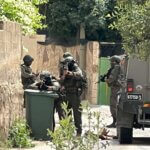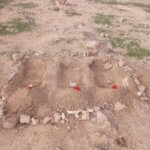Home Demolitions in the village of Fasayil
Renewed home demolitions occurred in the village of Fasayil in the Jordan Valley last week. The first demolition took place near the main road that leads to Fasayil. The first family whose home was demolished had not received a demolition order. Most of their valuables were left strewn across the middle of the field adjacent to which their house had stood beforehand.
The family reported that the ICRC came to the site of the demolition, yet denied the family emergency aid since they allegedly had a place to sleep. However, the family told us that they had to sleep outside because no help had been provided. One of the families in Fasayil complained in frustration about the lack of emergency relief, stating that several humanitarian aid organisations, among them UN OCHA and UNRWA, have visited the site, yet none have provided immediate assistance to the family that had lost their home. The family is quoted to have been “sad and frustrated” due to the lack of response from official organisations. A volunteer from Combatants for Peace is said to have bought them a tent from his own pocket in an attempt to respond directly to their dire situation.
The second demolition occurred on the same day. It was the 11th demolition that Ibrahim, the family father, had witnessed. The family had to spend the night under the tree after the demolition took place.
According to both families, the Israeli administration refused any support after having destroyed their entire livelihood. The Israeli authorities told them that “it was not their problem where they were to sleep” and that they could “sleep on the road”. Nobody is held accountable for the home demolitions and no immediate response is provided either.
Recurring demolitions of various structures in Palestinian villages located in Area C have been a longstanding and pervasive problem in the Jordan Valley. Other existential structures have been frequently targeted as well. In October, Haaretz reported that some 2,000 people were affected by the demolitions that took place in the Jordan Valley this year alone because Israeli forces operations also target water networks that nourish local communities.
The structures are largely destroyed with the excuse that the owners have no building permits. However, as a report by B’tselem explains, the Israeli Civil Administration completely prohibits construction in Area C, which comprises almost the whole are in which the affected villages are based. Thus, most people are left without a choice but to build their structures without a permit. Among the reasons for this are, for instance, large areas being declared as state land, survey land, firing zones, military training areas or natural parks. Often, lands are incorporated into the jurisdiction of settlements and adjoining agricultural soil. Thus, Palestinians are prohibited from building on some 70% of Area C. The report further explains that any construction must be permitted by the Civil Administration prior to building in the remaining 30% of the area. These permissions are extremely restrictive and to date, over 90% of the requested permissions have been denied.
According to Haaretz, the administration has destroyed 780 Palestinian structures alone in 2016 just in the Jordan Valley, compared to 453 in 2015. The number of Palestinians that have lost their homes and livelihoods due to these demolitions amounts to 1,129 alone in this year. 580 lost their homes in 2015.





